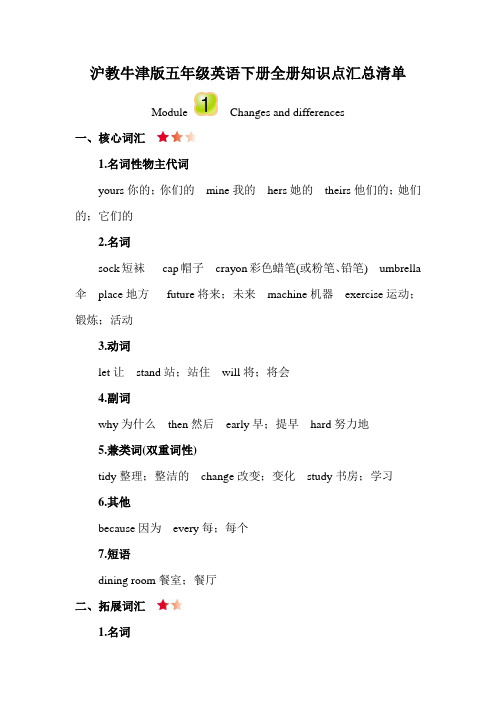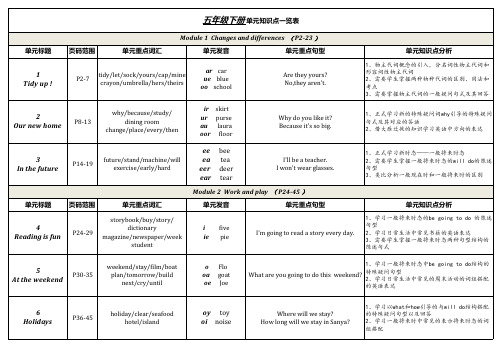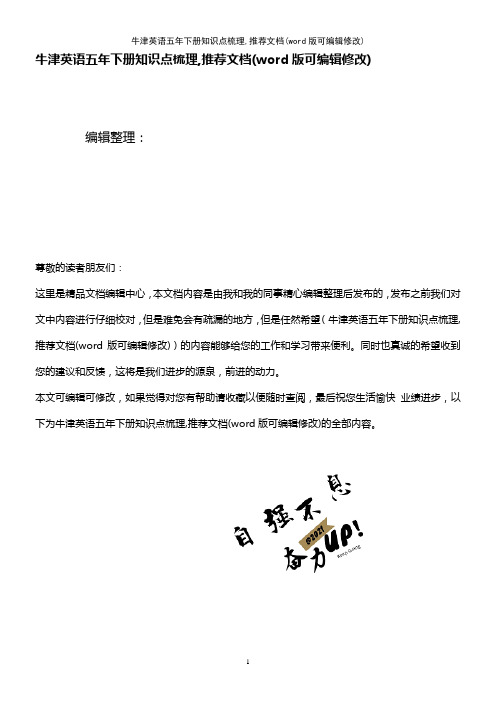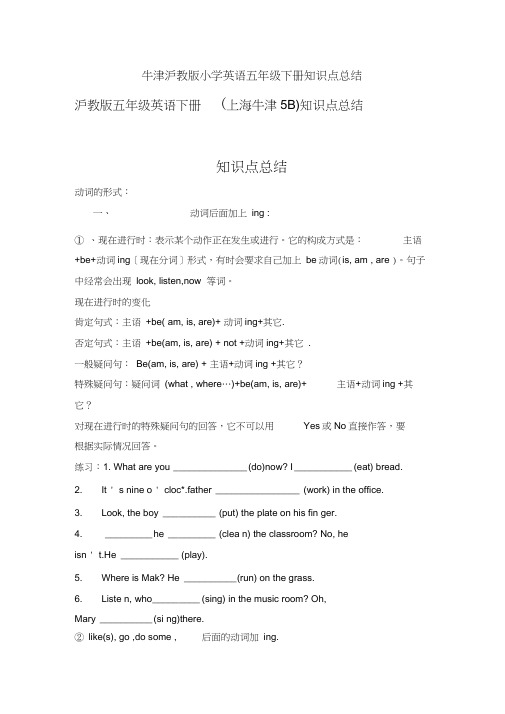(word完整版)上海牛津英语五年级下册语法点整理
沪教牛津版五年级英语下册全册知识点汇总清单

沪教牛津版五年级英语下册全册知识点汇总清单Module Changes and differences一、核心词汇1.名词性物主代词yours你的;你们的mine我的hers她的theirs他们的;她们的;它们的2.名词sock短袜cap帽子crayon彩色蜡笔(或粉笔、铅笔)umbrella 伞place地方future将来;未来machine机器exercise运动;锻炼;活动3.动词let让stand站;站住will将;将会4.副词why为什么then然后early早;提早hard努力地5.兼类词(双重词性)tidy整理;整洁的change改变;变化study书房;学习6.其他because因为every每;每个7.短语dining room餐室;餐厅二、拓展词汇1.名词nail钉子second秒(时间单位)mess脏乱;不整洁2.动词drop使落下;掉落stick粘贴;粘住3.形容词enough足够的more更多的4.副词twice两次easily容易地5.兼类词(双重词性)north北方;向北south南方;向南6.短语tidy up把……整理好(be) full of装满……;充满…… a few几个;一些wild goose大雁(复数wild geese) in the future将来in front of在……前面take a photo拍照wear glasses戴眼镜(be)weak in不擅长not …any more不再all day一天到晚do exercise做运动三、核心句型1.—Are they yours?它们是你的?—No,they aren’t. 不,它们不是。
解读: 问句是一个一般疑问句,用来询问某物的归属,有肯定和否定两种回答。
举一反三: —Are these crayons yours?这些蜡笔是你的吗?—No,they aren’t. 不,它们不是。
沪教牛津版五年级下册单元知识点一览表

1、学习以what和how引导的与will do结构搭配 的特殊疑问句型以及回答 2、学习一般将来时中常见的表示将来时态的词 组搭配
单元标题
7 Open day
页码范围
单元重点词汇
P46-51
meet/school gate/art room hall/finally/meeting room
show
五年级下册 单元知识点一览表
单元标题
1 Tidy up !
页码范围
单元重点词汇
Module 1 Changes and differences ( P2-23 )
单元发音
单元重点句型
P2-7
tidy/let/sock/yours/cap/mine crayon/umbrella/hers/theirs
1、正式学习新时态——一般将来时态 2、需要学生掌握一般将来时态的will do的陈述 句型 3、类比分析一般现在时和一般将来时的区别
单元知识点分析
1、学习一般将来时态的be going to do 的陈述 句型 2、学习日常生活中常见书籍的英语表达 3、需要学生掌握一般将来时态两种句型结构的 陈述句式
You should take some medicine. You shouldn't go to bed late.
1、学习日常生活中常见的不适症状以及需要注 意事项的英语表达 2、进一步学习以情态动词should引导的表示建 议的祈使句型
Module 4 Things we enjoy ( P68-87 )
1、学习日常生活中常见的节假日的英文表达
11 Chinese fesivals
P74-79
festival/important/call end/village/last
最新牛津英语五年级下册英语语法知识汇总-(1)

英语语法知识汇总-五B 第一课时——名词复数重点:名词的复数变化规则。
难点:灵活运用。
这里强调两点:不可数名词都默认为单数,所以总是用is.1.一般+s 如map→maps , bag→bags 等2.特殊:以s,x,sh,ch 结尾的单词+es 如bus→buses , watch→watches 等;3.以辅音字母+y 结尾,去掉y 加上ies ,以元音字母+y 结尾加上s4.以f 或fe 结尾,去掉f/fe 加上ves 。
如 knife→knives leaf→leaves wolf→wolves wife→wives life→lives thief→thieves5.有时可数,有时不可数:典型例词:fish 当它解释为鱼肉时是不可数名词,当它解释成同一种鱼时,单复数同形,复数即为fish ,当它解释为不同一种鱼时,+es,即为fishes.6.以o 结尾,a) photo→photos ,piano→pianos,radio→radios ,zoo→zoos b )加es 的名词有:potato→potatoes tomato→tomatoes7.特殊词:child---children(小孩) man--men (男人) woman--women(女人) 8.单复数同形(单数和复数一样)people(人)sheep(绵羊) deer (鹿)) 9.国人变复数 :口诀:中日不变英法变,其余s 加后面。
Chinese--Chinese Japanese--JapaneseEnglishman--Englishmen Frenchman--Frenchmen American--Americans 等等10. 字母、数字、引语、缩略语变复数,在其后加s 或's 。
eg. There are two t's in the word “bottle".各种不同情况 变化方法 例词一般情况直接加-sbook-books bag-bags cat-cats bed-beds 以s. x. sh. ch结尾加-esbus-buses box-boxes brush-brushes watch-watches peach —peaches glass--glasses以“辅音字母+y”结尾变y 为i, 再加-es family-families study--studies以“f 或fe”结尾变f 或fe 为v ,再加-esknife-knives不规则名词复数man-men woman-women policeman-policemen policewoman-policewomen mouse-mice foot-f eet child-children fish-fish Chinese-ChineseThere are two 1's i n the number “2011".一、用所给的单词的复数的正确形式填空: 1> There are three ______(chair) in the classroom. 2>These _______(tomato) are red.3>My brother looks after two ______(baby) 4> My father likes to eat _______(potato). 5>Chinese ______(people)like to eat noodles. 6>I have a lot of ______(toy) in my bedroom.7>I help my mother wash ______(dish) in the kitchen. 8>I have two ______(pencil-box).9>There are some ______(bus)in the street. 10>Peter has eight _____(foot). 二、选择填空( )1.I can see three ________ in the zoo. A monkeys B monkeyes C monkey ( )2.The pig has four ______. A. foot B. feet C. foots( )3.My two brothers are both ______. A. policeman B. policemans C. policemen ( )4.I can see ten _____ in the picture. A. sheep B. dog C. pig( )5.The _____ has three__. A. boys, watches B. boy, watch C. boy, watches ( )6.Can you see _______on the plate? A. bread B. breads C. breades( )7.The girl often brushes her_____ before she goes to bed. A. tooth B. tooths C. teeth ( )8.Mr Black often drink some _________.A. milk B. milks kes ( )9.There are some _____on the floor. A. child B. water C. books( )10..Lucy will show us some new ____ of hers. A. photo B. photos C. Photoes 第二课时——2、人称代词和物主代词重点:区分人称代词和物主代词。
上海牛津英语五年级下册语法点

上海牛津英语五年级下册语法点Document serial number【NL89WT-NY98YT-NC8CB-NNUUT-NUT108】上海牛津英语五年级下册语法点整理动词的形式:一、动词后面加上ing:①、现在进行时:表示某个动作正在发生或进行。
它的构成方式是:主语+be+动词ing〔现在分词〕形式,有时会要求自己加上be动词(is,am,are)。
句子中经常会出现look,listen,now……等词。
现在进行时的变化肯定句式:主语+be(am,is,are)+动词ing+其它.否定句式:主语+be(am,is,are)+not+动词ing+其它.一般疑问句:Be(am,is,are)+主语+动词ing+其它?特殊疑问句:疑问词(what,where…)+be(am,is,are)+主语+动词ing+其它?对现在进行时的特殊疑问句的回答,它不可以用Yes或No直接作答,要根据实际情况回答。
练习:1.Whatareyou_________(do)nowI___________(eat)bread.2.It’snineo’clock..Myfather_______________(work)intheoffice.3.Look,theboy____________(put)theplateonhisfinger.4.__________he__________(clean)theclassroomNo,heisn’t.He____________(play).5.WhereisMakHe___________(run)onthegrass.6.Listen,who___________(sing)inthemusicroomOh,Mary___________(sing)there.②like(s),go,dosome,后面的动词加ing.如:1.Ilike(play)football,butmyfatherlikes(play)chess.2.Let’sgo(swim).二、动词后面加s/es.这就有关一种时态:一般现在时。
牛津上海版五年级下册英语必背笔记

五年级下册英语必背笔记U11.tidy it up把它整理好2.look at 看3.What a mess!多么乱啊!4.Let's=Let us 让我们5.what什么why为什么where在哪儿who谁whose谁的when什么时候which哪一个how 怎么样6.those那些 that那个these这些 this这个7.I'm=I amhe/she/it/单数/不可数名词+isyou/we/they/复数名词+are8.Paul's保罗的9.put…on 把…放到…put on穿上10. There is 有就近原则There are 有就近原则eg. There is a dog and three cats. 有一只狗和三只猫。
There are three cats and a dog. 有三只猫和一只狗。
11.too 也(放后面)also也(放中间)12.now 现在13.clean and tidy 干净整洁14.You're welcome. 不客气,不用谢15.a magic stone 一个神奇的石头16.on the table在桌子上17.be full of充满、装满18.ask问answer回答19.drop the box 使盒子掉落20.all都,所有的(三个或三个以上)both都(两个)21.on the floor在地板上22.he他(主格)him他(宾格)his他的23.mine我的 his 他的 hers她的 yours你的、你们的 ours我们的 theirs他们的24.try it试试它25.near附近26.stick to粘住27.in a few seconds几秒钟后second第二、秒28.again再一、又一U21.our我们的 their他们的 her她(的)2.at home在家3.Do you like…?你喜欢…吗?Yes,l do.No,l don't.4.living room客厅dining room餐厅study书房、学习 bedroom卧室 kitchen厨房 bathroom浴室5.Why do you like it?你为什么喜欢它?Because it's…因为它…6.so big好大7.What about you?你呢?8.quiet安静的 quite相当、确实9.read and write读和写10.there那里11.Do you know why?你知道为什么吗?12.in the garden在花园里13.all day一天到晚14.wild goose 大雁复数为:wild geese15.life生活复数为:livesbusy lives忙碌的生活16.from…to …从…到…17.one place一个地方18.another另一个19.change改变、变化20.twice两次21.spring春天 summer夏天 autumn秋天 winter冬天22.east东方 south南方 west西方 north北方23.move around四处移动24.so much如此多so所以25.cannot=can't不能26.enough food足够的食物27.then然后28.warm温暖的29.fly back飞回来U31.in the future在未来2.know about知道关于3.I'll=I will我将won't=will notI will be a teacher. 我将成为一名老师。
沪教牛津版(深圳用)五年级英语下册Module1Unit1Tidyup!知识梳理

沪教牛津版(深圳用)五年级英语下册Unit 1 Tidy up!整理好! 知识梳理语块整体记忆习惯搭配/短语:1. look at看一看2. tidy up把...整理好3. put...on...把...放到...上惯用语:1. What a mess!真是一团糟!2. Sure!当然可以!3. You’re welcome!不用客气!句型框架:1. Let's...2. Are they...?3. Whose...is this/are those?4. Can you....?5. There is/are...6. Thank you for...词汇全解mess 脏乱;不整洁;短语make a mess巧记me(我)+ss=mess(脏乱;不整洁)形近miss想念;错过let 让;形近leg腿,pet宠物,wet潮湿的,get获得,set设置;近音light n.光第三人称单数lets;用法let后接人称代词时,人称代词要用宾格形式。
例句Let's play football.让我们踢足球吧。
tidy 整理;第三人称单数tidies;过去式tidied;形近tiny微小的;极小的动词-ing形式tidying;其他词义tidy收拾;转化tidy adj.(形容词)整洁的短语tidy up把……整理好例句Do you often tidy your room?你经常整理你的房间吗?sock短袜复数socks;形近cock公鸡短语a pair of socks一双短袜例句Where are my socks?我的短袜在哪里?yours你的;你们的;形容词性物主代词your你的;你们的联想mine我的,ours我们的,his他的,hers她的巧记your(你的;你们的)+s=yours(你的;你们的)例句My ruler is longer than yours.我的尺子比你的长。
牛津英语五年下册知识点梳理,推荐文档(2021年整理)

牛津英语五年下册知识点梳理,推荐文档(word版可编辑修改)编辑整理:尊敬的读者朋友们:这里是精品文档编辑中心,本文档内容是由我和我的同事精心编辑整理后发布的,发布之前我们对文中内容进行仔细校对,但是难免会有疏漏的地方,但是任然希望(牛津英语五年下册知识点梳理,推荐文档(word版可编辑修改))的内容能够给您的工作和学习带来便利。
同时也真诚的希望收到您的建议和反馈,这将是我们进步的源泉,前进的动力。
本文可编辑可修改,如果觉得对您有帮助请收藏以便随时查阅,最后祝您生活愉快业绩进步,以下为牛津英语五年下册知识点梳理,推荐文档(word版可编辑修改)的全部内容。
五年级下册知识点Unit1词组:1。
在星期一上午 on Monday morning 2。
今天下午 this afternoon3 .三节数学课 three Maths lessons4 。
新学期 the new term5. 第一节课 the first lesson 6 .立刻、马上 at once7 .10门学科 ten subjects 8 .一节有趣的课 an interesting lesson 9 。
你呢? How about you? 10 .在一周内 in a week11 .欢迎回来 welcome back 12。
我的课程表 my timetable13。
在星期三 on Wednesday 14 .星期天晚上 Sunday evening15 .这个学期 this term 16. 上一堂艺术课 have an Art lesson17 。
每天 every day 18.一个窍门 a trick19 .让我想想 let me see 20 .非常 very much句型:1.我们可以用下列句型来谈论学习的科目、课表,如:What lessons do you have in the morning/afternoon? 上午/下午你们有什么课程?What lessons do you have on Monday/ Wednesday? (注意:在星期几用on)星期一/星期三你们有什么课程?What subject do you like?你喜欢什么科目?I like English. How about you?我喜欢英语.那你呢?I like Science. 我喜欢科学.2.我们想要询问今天是星期几时,可以用;—- What day is it today? —— It’s Monday。
牛津沪教版小学英语五年级下册知识点总结

牛津沪教版小学英语五年级下册知识点总结沪教版五年级英语下册(上海牛津5B)知识点总结知识点总结动词的形式:一、动词后面加上ing :①、现在进行时:表示某个动作正在发生或进行。
它的构成方式是:主语+be+动词ing〔现在分词〕形式,有时会要求自己加上be动词(is, am , are )。
句子中经常会出现look, listen,now 等词。
现在进行时的变化肯定句式:主语+be( am, is, are)+ 动词ing+其它.否定句式:主语+be(am, is, are) + not +动词ing+其它.一般疑问句:Be(am, is, are) + 主语+动词ing +其它?特殊疑问句:疑问词(what , where…)+be(am, is, are)+ 主语+动词ing +其它?对现在进行时的特殊疑问句的回答,它不可以用Yes或No直接作答,要根据实际情况回答。
练习:1. What are you ______________ (do)now? I ___________ (eat) bread.2. It ' s nine o ' cloc*.father ________________ (work) in the office.3. Look, the boy __________ (put) the plate on his fin ger.4. _________ he _________ (clea n) the classroom? No, heisn ' t.He ___________ (play).5. Where is Mak? He __________ (run) on the grass.6. Liste n, who _________ (sing) in the music room? Oh,Mary __________ (si ng)there.②like(s), go ,do some , 后面的动词加ing.如:1.1 like (play ) football, but my father likes (play) chess.2. ____________ Let ' s go wim).二、动词后面加s/es.这就有关一种时态:一般现在时。
- 1、下载文档前请自行甄别文档内容的完整性,平台不提供额外的编辑、内容补充、找答案等附加服务。
- 2、"仅部分预览"的文档,不可在线预览部分如存在完整性等问题,可反馈申请退款(可完整预览的文档不适用该条件!)。
- 3、如文档侵犯您的权益,请联系客服反馈,我们会尽快为您处理(人工客服工作时间:9:00-18:30)。
上海牛津英语五年级下册语法点整理
动词的形式:
一、动词后面加上ing :
①、现在进行时:表示某个动作正在发生或进行。
它的构成方式是:主语+be+动词ing〔现在分词〕形式,有时会要求自己加上be动词(is, am , are )。
句子中经常会出现look, listen, now……等词。
现在进行时的变化
肯定句式:主语+be( am, is, are)+动词ing+其它.
否定句式:主语+be(am, is, are) +not +动词ing+其它.
一般疑问句:Be(am, is, are) +主语+动词ing +其它?
特殊疑问句:疑问词(what , where…)+be(am, is, are)+主语+动词ing +其它?对现在进行时的特殊疑问句的回答,它不可以用Yes或No直接作答,要根据实际情况回答。
练习:1. What are you _________(do) now? I ___________(eat) bread.
2. It’s nine o’clock.. My father_______________(work) in the office.
3. Look, the boy____________(put) the plate on his finger.
4. __________he__________(clean) the classroom? No, he isn’t. He____________(play).
5. Where is Mak? He___________(run) on the grass.
6. Listen, who___________(sing) in the music room? Oh, Mary___________(sing) there.
②like(s), go , do some , 后面的动词加ing.
如:1. I like (play ) football, but my father likes (play) chess.
2.Let’s go (swim).
二、动词后面加s/es. 这就有关一种时态:一般现在时。
一般现在时:表示经常性的事情。
时间状语:often经常, usually通常, always总是,every每个, sometimes有时,
at…在几点钟
它的动词变化与主语人称有关,只有肯定句中第三人称单数用动词三单(动词加s/es),其余动词均用原形。
在否定句和问句中,因为有助动词do, don’t , does , doesn’t,所以后面的动词用原形。
三单变化:多数在动词后加s play—plays like—likes
以s,x,sh,ch,o结尾的动词加es go—goes wash—washes watch--watches
以辅音字母加y结尾,把y改i再加es fly—flies study—studies
一般现在时的变化:
1、肯定句:主语(非三单)+动原+其它/ 主语(he , she )+动词三单+其它。
2、否定句:主语(非三单)+don’t+动原+其它/ 主语(he , she )+动原+其它。
3、一般疑问句:Do +主语(非三单)+动原+其它/ Does +主语(he, she )+动原+其它。
4、特殊疑问句:特殊疑问词(What, Where …)+do +主语(非三单)+动原+其它
特殊疑问词(What, Where…)+ does +主语(he , she )+动原+其它。
练习:1. We often___________(play) in the playgound.
2. He _________(get) up at six o’clock.
3. __________you _________(brush) your teeth every morning?
4. What (do) he usually (do) after school?
5. Danny (study) English,Chinese,Maths,Science and Art at school.
6. Mike sometimes __________(go) to the park with his sister.
7. At eight at night, she __________(watch) TV with his parents.
8. ________ Mike________(read) English every day?
9. How many lessons_________your classmate________(have) on Monday?
10. What time_________his mother_________(do) the housework?
11. What you usually (do ) on Sundays ?
12. He ( not like ) ( drink ) tea .
13. They (not like ) ( play ) cards.
三、动词用原形的名显特征有:1、在can , can’t, let’s , shall we 后面用原形。
2、助动词do , don’t , does , doesn’t 后面动词用原形。
练习:1、He can ( put ) an egg on his mouth .
2. Let’s ( clean ) the library now.
3. Shall we (have ) lunch at eleven o’clock?
4. Does your uncle (water) flowers every day ?
总练习:用所给动词的适当形式填空:
1. Wang Bing is (write) an e-mail to his friend in the study.
2. I (play) the piano, my brother (watch) TV now.
3.He can (swim), but I (not),I can (ski).
4.Let’s (go) and (play) basketball .
5.Shall we (clean) the classroom now.
6.I (like) (skate),my parents (not),they (like) (swim).
7.Miss Green (like) (dance) very much.
8. (do) Uncle Wang (run) fast?
9.GaoShan often (go) (swim) in Summer(夏天).
10.Do you (have) (some) (bobby)? Yes, I (do).
11 (do) your father (watch) TV in the evening?No, he (not).
12.This is Helen (speak).
13.Tom usually (play) football after school.
14.He (live) in a small town near Nanjing.
15.Pingping (write) an e-mail to his friend now.
16.What (do) Nancy usually (do)? She usually (grow) flowers .
17. My father ___ __(like) that song very much. He often ___ __(sing) it.
18. ________he ________(watch) TV in the evening? No, he ________
19. My parents usually________(get) up at 6. My sister _______(get) up at 6:15, and I usually _________(get) up at 6:30
20. _______your father _______(fly) kites over there now? Let me see. Yes, he ______. He often ________(fly) kites there. Shall we ______(go) to have a look?
21. My aunt (not like ) ( cook ).。
